Egypt
Learn more about the region below
Overview
Egypt, the most populous country in the Arab world, is located in northeastern Africa and has a rich history dating back thousands of years, making it a cultural and historical powerhouse. While Egypt faces challenges such as rapid population growth, food insecurity, and economic instability, it remains a significant geopolitical actor. Egypt’s population is concentrated along the Nile River, with Cairo being the largest city and a central hub for both political and economic activity. Additionally, Egypt is home to a large number of refugees and asylum seekers, many fleeing conflict and instability in neighboring regions.
Country Facts
- Population: 118.4 million (2023 estimate)
- Population Growth: Rapid, with projections suggesting an increase to 161.6 million by 2050.
- Food Security: Egypt has moderate food insecurity, with issues related to affordability, quality, and safety of food. The Global Hunger Index ranks Egypt 63 out of 127 countries.
- Poverty: Although poverty is declining, it still disproportionately affects women and youth.
- Environmental Challenges: Population growth and water scarcity are significant challenges, particularly as Egypt’s resources, especially water from the Nile, are stretched thin.
Crisis
Egypt is facing a complex humanitarian situation, exacerbated by rapid population growth, food insecurity, and environmental stress. Over 902,700 registered refugees and asylum seekers live in Egypt, many from Sudan, Syria, and other parts of Africa and the Middle East. The influx of refugees, particularly from Sudan due to the ongoing conflict, has put additional strain on Egypt’s already limited resources. Refugees in Egypt are often faced with challenges including limited access to education, healthcare, and employment, making their integration into society difficult.
Egypt's new asylum law, passed in late 2024, has raised concerns regarding potential restrictions on refugees' rights and access to essential services. Despite these challenges, Egypt continues to work with international agencies like UNHCR to provide life-saving assistance, such as food aid, medical care, and education, to both refugees and vulnerable Egyptian communities.
In addition to the humanitarian crisis, Egypt faces significant internal issues such as high poverty rates, especially among women and youth, as well as food insecurity affecting 6.5% of children under 5 who suffer from stunting or wasting. The country’s economy is struggling due to inflation and currency devaluation, which have further increased the vulnerability of both refugees and the host population.
Frequently Asked Questions (FAQs)
How many refugees live in Egypt?
As of December 2023, Egypt is home to over 902,700 registered refugees and asylum seekers, with the largest groups coming from Sudan, Syria, South Sudan, Eritrea, and other countries in the Horn of Africa.
What are the main challenges faced by refugees in Egypt?
Refugees in Egypt face a variety of challenges, including limited access to education, healthcare, and employment. Many struggle to meet basic needs, as inflation and unemployment rates are high. Refugees also face legal and social barriers, with many unable to obtain permanent residency or secure jobs
How does Egypt support refugees?
Egypt, in collaboration with UNHCR and other international partners, provides refugees with access to basic services, including food assistance, medical care, and education. Additionally, the government has incorporated refugees into various social programs, although access to some services remains limited.
What is the situation with Sudanese refugees in Egypt?
Sudanese refugees have become the largest group of refugees in Egypt, with over 300,000 registering with UNHCR by the end of 2023. The ongoing conflict in Sudan has forced many Sudanese to flee to Egypt in search of safety, adding significant pressure to the country's resources.
What impact has the influx of refugees had on Egypt’s economy?
The influx of refugees, particularly Sudanese, has contributed to increased demand for housing and social services, driving up property prices and rents, particularly in Cairo. Refugees often face difficulties accessing employment and basic services, contributing to economic strain, particularly for low-income Egyptia
How can I help refugees in Egypt?
You can help refugees in Egypt by donating to organizations like UNHCR and local NGOs that provide humanitarian assistance, including food, medical care, and education. Additionally, volunteering your time or skills can also make a significant impact.
